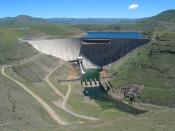1.1 Political
Having gained independence in 1966 from being a British protectorate, Lesotho is a constitutional monarchy, with the king, Letsie III, as head of state, although his power has been curtailed, meaning he has no official power. Executive power resides in the government, led by the Prime Minister. There is a dual legal system with traditional Customary Law and General Law based on the Roman-Dutch system and a constitution that provides for a clear separation of powers among the executive, legislative and judiciary.
The bicameral parliament consists of a Lower House, the National Assembly, whose members are elected by universal suffrage, and a 33-seat upper house, the Senate, with 22 principal chiefs and 11 other persons nominated by the king.
Fundamental human rights and the freedom of all persons are guaranteed under the constitution, a guarantee that is reinforced through Lesotho being a signatory to most of the UN Human Rights Treaties.
However, although Lesotho is a signatory to the Convention on Elimination of all Forms of Discrimination against Women, under Customary Law women are treated as minors and a number of gender-discriminatory laws remain. The political situation in Lesotho is currently stable.
The main political parties in Lesotho are the Lesotho Congress of Democracy (LCD), the Lesotho Peoples Congress (LPC), the Basutoland Congress Party (BCP) and the Basotho National Party (BNP). A further 16 parties exists which were established in 2001/02.
Legislative elections took place in 2002 with the ruling Lesotho Congress for Democracy (LCD) remaining in power.
The trade union movement is weak and fragmented, the business community is divided upon different economic approaches and institutional linkages, with many businesses being foreign-owned and having no political affiliation. Although the churches still play an important role, their influence is diminishing. Several weekly newspapers, many of them critical of...


